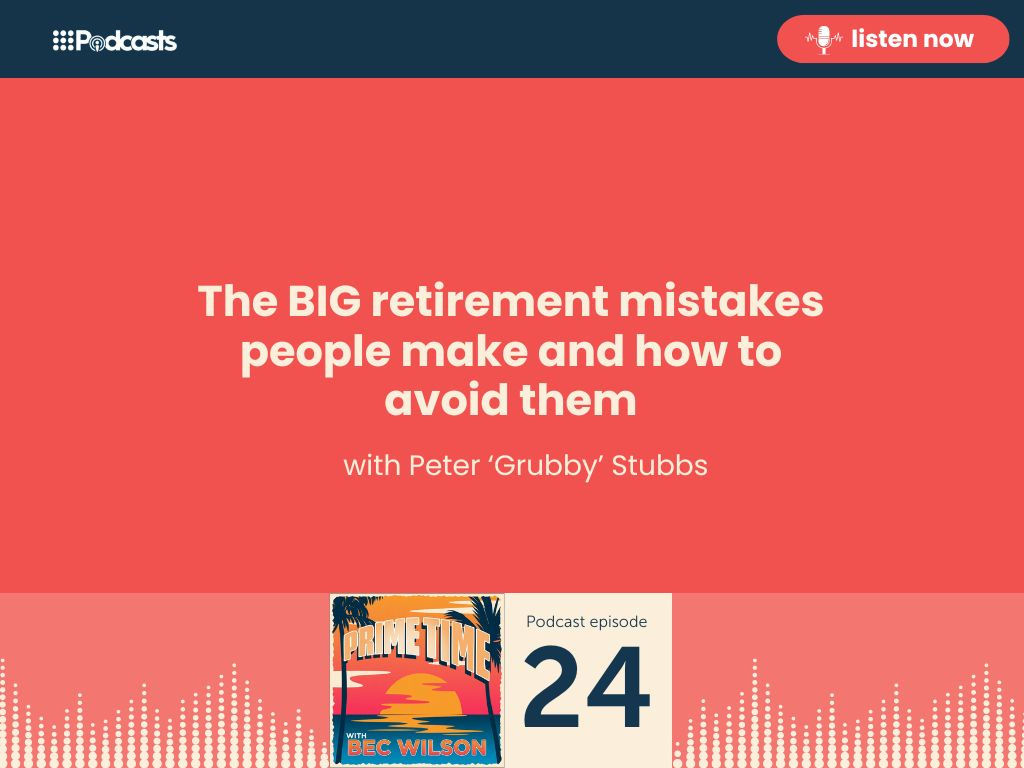Cash is dead. Why are we still pretending it isn’t?
Many are apprehensive about and afraid of the change that is clearly coming. But learning about it is important now in my opinion.
Happy Mothers’ Day! I hope you’re setting up for a lovely day.
This weekend I opened a rather large can of worms in my article in The Age and The Sydney Morning Herald. And after lots of strongly voiced feedback, which I expected. I am still adamant that I wrote this for an important reason. I feel very strongly that older Australians hear and understand the changes in the cash economy and take more active steps to learn about and use digital banking, digital transactions and digital wallets, even if it is only some of the time. My article goes into some length on why and how. I take no political stance here, and have no interest in or from the banks. I am just deeply interested in the financial literacy of older Australians. But you’re already here and you know I’m on your team.
As you’ll read, just 13% of transactions are now happening in cash across Australia. That’s all! Yet only 9% of over 65s in this country use a digital wallet, a massive contrast with every other agegroup. If we plan to live longer, healthier lives, this is one of the tools we will all need and the statistics support that.
So today I ask you to consider giving it a try, if you aren’t already. You don’t have to use it daily, but the ability to use it is important. If you’re already an adopter of digital transacting, speak up! Don’t be silent, be proud! It changes the conversation tone. And if you know someone who needs encouragement and support to get there, please help them.
Three other things to talk about today before the story itself!
The six week How to Have an Epic Retirement Flagship Course is coming up really soon…
The How to Have an Epic Retirement Flagship Course is kicking off on the 6th June and it runs to the 18th July. I want to invite you along. It's hosted by me, There’s 8.5 hours of education, plus I've invited some of Australia's most respected experts on retirement, longevity, safe spending, retirement travel and finding your purpose to join us for live Q&A sessions for each week of the six week program. These events each week are a real highlight.
It's an amazing program, built from my bestselling book How to Have an Epic Retirement. In our recently completed Autumn Edition, 100% of attendees completed said they'd recommend it to their friends, and they left amazing testimonials.
And, since then, we've just sent to print a 150+ page workbook to support the program too.
There's currently a 25% earlybird discount on tickets that drops off later this month. I really do think everyone approaching retirement can benefit from the course.
There's a comprehensive brochure on the website at www.epicretirement.com.au/upcoming-courses
I'd love you to join us, knowing you'll learn about and become more comfortable with all the systems, concepts and important parts of an epic retirement, and you'll do it alongside others that you can learn from too as we all kick off together.
So take a look, read the testimonials and lock in your place.
This week’s Prime Time podcast is a ripper!
Make sure you have a listen to this week’s Prime Time podcast. I’m chatting with radio legend Peter ‘Grubby’ Stubbs who makes for such wonderful conversation. The topic… “The BIG retirement mistakes people make and how to avoid making them” is so interesting too. We also have Jacki Ellis C.F.A. from Aware Super in for some superannuation mythbusting that’s really fun. I’ve been told by people in the Epic Retirement Club Facebook group that they think this is the best podcast yet! More below.
Epic Retirement- the book on sale on Amazon
Finally, Amazon has How to Have an Epic Retirement, the book, on 37% off. It’s #1 in about five different Amazon categories right now, and was the #1 best selling retirement book in 2023 in Australia and the #2 Finance and Consumer issues book behind the Barefoot Investor too. If you haven’t got yourself a copy, now’s your chance.
And that’s it for today. I hope you all have a lovely day and the mums get spoiled. I’m off for a three-generation Mothers’ Day celebration - special!
Make it epic!
Many thanks! Bec Wilson
Author, podcast host, columnist, retirement educator, and guest speaker
Cash is dead. Why are we still pretending it isn’t?
This article was first published in The Age, The Sydney Morning Herald, Brisbane Times and WA Today.
“Cash is king,” “Seniors want to use cash,” and “It will be the downfall of democracy” are just some of the cries you can read on Facebook posts about the rapid disappearance of cash in our economy.
Many are apprehensive about and afraid of the change that is clearly coming. According to the latest Stripe report on cash payments in Australia, cash now makes up less than 13 per cent of payments, and banks project it will be gone as a currency in just seven years time.
But no one is helping seniors bridge this gap at scale. In fact, some are trying to feed off their pain, which, I think, is deeply irresponsible.
So, my call today is twofold. If you’re an older Australian who isn’t using online banking, hasn’t embraced your digital wallet, and is anxious about the change to digital currency, it’s time to declare that resistance is futile. It’s time to ask for help, learn, and gradually embrace it. If you start now, it won’t have to happen overnight.
And to the government, the opposition, the banks, the peak bodies and the other organisations supporting seniors, it’s time to stand up and do this properly.
Fifty-eight years ago, our country moved to decimal currency. They set a date for the change to occur, and the whole country got behind it with ad campaigns, support and education, moving everyone, young and old, from pennies and pounds to dollars and cents.
It’s important we all do our bit to help our older Australians embrace digital transacting.
It was a huge change and no doubt some thought it was a dumb idea. But they had to go with it because there was no alternative.
The shift to digital currency has been different, organic, and led by those who benefit. Younger and middle generations, businesses, banks and government institutions have all embraced online transactions and digital wallets for efficiency and safety.
But they haven’t brought older Australians with them. Academics point out a concerning trend: the financial literacy of even the most competent people declines as we get older, making adoption harder the later we leave it in our lives. So what are we waiting for?
Only 9 per cent of over-65s in this country use digital wallets. And that’s tripled in the last three years. Those adopters are reaping the benefits quite silently, while those who haven’t are outspoken about their concerns. Most don’t realise the benefits of digital transacting are enjoyed by both retailers and consumers alike. If it’s just seven years or less until the end of cash, we have a big job to do to drive up adoption.
Today, let’s look at those benefits, then at the steps people need to take to get on the digital wagon safely, building their confidence over time.
The advantages of digital payments are as widespread for seniors as for other age groups. Embracing digital transactions provides unparalleled convenience. Gone are the days of hunting for an ATM, lugging around a bulky wallet of cards, or having to make a trip to the branch to move money around.
Instead, you can carry multiple credit cards, debit cards and loyalty cards in one place on your phone or digital watch. And a simple tap completes a transaction seamlessly and without any physical hand-to-hand contact.
You can log into online banking and reconcile your payments in real time, allowing you deep transparency of your spending. And, more importantly, digital payments offer enhanced security compared to traditional cash transactions.
While tales of cyber hacks and scams may evoke fear, they are really modern counterparts to the age-old risks of physical theft, like handbag snatching, store hold-ups, and home break-ins targeting cash. The upside is that any theft is free of violence and can usually be avoided with good digital caution, which needs to be part of the education process.
Digital wallets are increasingly the preferred currency in urban and regional areas, reducing the need for retailers (and everyday people) to handle, bank and secure cash. As a daughter of a retired shop-owner for whom banking the daily cash takings was fraught with danger, I think that’s good news.
So, it’s time to get practical. If you have the ability and you’re resisting the shift to digital transactions, or you know someone who is, it’s time to help yourselves or them across to the new world. Sure, you’ll need to have a laptop, desktop, tablet or smartphone to get started. But that’s not as much of an issue as it used to be with refurbished devices available at reasonable costs.
Now, here are the things I think you should plan to learn about and use in order
This article continues.
Please read the rest of it on the Sydney Morning Herald here. It doesn’t have a paywall. You may have to sign up to access it.
Today, I chat with Peter "Grubby" Stubbs, radio veteran and a huge advocate for getting the most out of life. Together, we're looking at the biggest mistakes people make in the lead up to retirement, breaking down everything from when to start planning, finding your passions and why underestimating the value of work could result in retiring too early.
From the rookie errors to the nitty gritty financial stuff, this episode is packed with practical advice and insights that will help prevent you from making any of these common mistakes.
Also joining me is Jacki Ellis, CFA and Head of Retirement at Aware Super, proud sponsors of Prime Time to help us unpack in a really fun way the truths and mistruths about our superannuation.
Have a listen here:













True Aengus, but it's not exageration is propaganda. The banks have a hard campaign to remove cash, as cashless means more lowered costs, less personnel (bank execs get fat bonusus from retrenching people), ergo, higher profit. How successfully they lobby Government depends on which party they donate to. I use on-line banking, from a PC, with a full 3rd party security suite. I use Paypal. I do not use my phone for any financial transaction as I know from 45 years in IT that software and mobile phone manufacturers cannot be trusted to not secretly harvest data (there is $$ in it for them). If you think you know what your phone is doing you are delusional. Moreover, if I'm stupid enough to lose my phone I have no risk. Also, I have no issue with 'lugging around' credit cards.
Cash will stay because the transactions are simple and without risk, you don't pay charges to use cash, and if financial experts that provide advice to young people are successful, then young people will stop using the phone and use more cash because they have more control over their limited funds.
Cash is dead?
Nah,you getting a kick back from the Banks ?